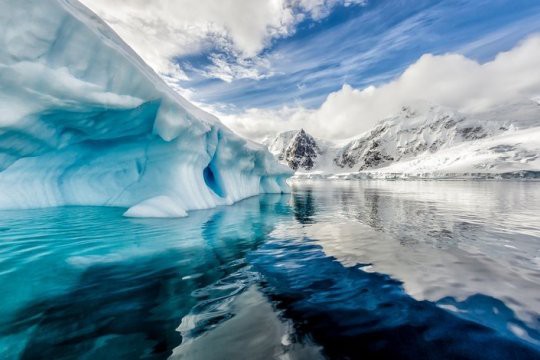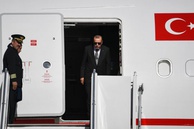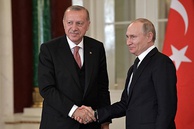Atop Murmansk, the world’s largest city north of the Arctic Circle, 1,300 participants from 21 countries gathered to discuss the socioeconomic potential of the region, including multilateral mechanisms for cooperative discovery and efficient development of the Arctic’s rich natural resources.
In a panel dedicated to international cooperation and the environment, I had the blessed opportunity of joining Vladislav Maslennikov, Director of the Department of European Issues at the Ministry of Foreign Affairs of the Russian Federation, and Vladimir Vasilev, Executive Director at The Secretariat of the Northern Forum, among other speakers, to share some ideas on cooperation among regional and non-regional states.
Drawing from personal observations of my native backyard, I put forth that the interests of Asian states in the Arctic are motivated by a combination of scientific curiosity, environmental concerns, and economic opportunities stemming from shipping routes and resource extraction. For example, China considers Arctic research as part of its broader strategy to enhance its regional presence and has invested in research stations - as has India. Japan and South Korea are also active in environmental monitoring, among other undertakings.
Lest we forget, the ASEAN member states in Southeast Asia are eager to get onboard too, not the least of which because countries like Vietnam, Indonesia, Malaysia, Singapore, and Thailand know they’ll be the first to go when sea level rises. Singapore, with its deep pockets, has already allocated $72 billion to build a seawall, despite its lack of adequate or convincing conversations on the resulting damage to the vulnerable ecosystem.
Located in a region with immense need for resources, Singapore further renders a sense of catharsis as the only Southeast Asian country to have sanctioned the energy giant that is Russia, and the only Southeast Asian country to have achieved a failing grade in energy security.
Abuse of Climate Change Platform
Beyond balancing contending essentials and serving up poetic justice, consistency begs to be featured too. Should air conditioning be blasting in government buildings housing just a few bodies while patients in hospitals are being deprived of comfort and air conditioning in the name of resource conservation? Such discomfort in the humid tropics is further compounded by dangers emitting from dengue-carrying mosquitoes and haze from regional deforestation. Let’s make up our minds: Are we sincere about climate change—or are we simply abusing its platform to enlarge the economic and social divide between the haves and have-nots?
In my personal dialogues with Prof. Anis Bajrektarevic, no words get minced calling out developed countries that exploit the climate change platform to create a new market of monopolized green technologies, only to compel them upon the developing countries—the Global South.
These are the same malefactors who lead the ensnarement of our world in a consumption drive driven by an information sphere contaminated by banalities manufactured by social networks, reality shows, and celebrities to sell us those things we need like holes in the head.
If we truly believe our crisis is one of the environment, then we must muster the courage and honesty to call out the true culprits of pollution and aggression. We need to stop waging wars, stop regime change, and stop blowing our planet up with artillery strikes, rockets, and landmines.
We also need to stop catering to the interests and profit-driven agendas of MNCs and of developed countries that are simply constructing a new facade of economic subordination, or rather, modern colonial chains.
The Stones in Our Path
From Copenhagen, Durban, and Rio+20 to Paris COP 21 and beyond, the undeniable fact remains: the world needs principles and harmonized actions to tackle the gravest problems of our planet.
However, we are sadly deficient in the most fundamental consensus at the Bretton Woods institutions. We disagree in the WTO Doha Development Round, in the IPCC, on nuclear non-proliferation (and NPT), on migration, on the Middle East, on the Tobin tax initiative, on the post-Kyoto negotiations, and in this case, on the state of our environment, and that’s just to name a few altercating drops in the mucky bucket. To sum up, we have fundamentally disagreed on the most serious issues of our planet, including competent ways of addressing them.
While some semblance of comfort can be found in the many bilateral and multilateral endeavors, including the Arctic Council’s scientific working groups, the IASC, and various UN frameworks to encourage data sharing, some key players like the US have not even ratified UNCLOS, while members of the Arctic Council petulantly elected to ostracize rather than collaborate with Russia on significant climate issues because of their varied perspectives towards the Ukraine conflict. Is it not time we stop politicizing environmental organizations, just like we need to stop politicizing sports, educational, cultural, and religious organizations?
Sense and Sensibility
Finally, what’s missing too in our climate change debate is a sensible recognition of the process as a natural and cyclical activity that has taken place over millions of years. That’s not to say humans do not bear an impact, but we have to understand that our God-created nature came equipped with an extraordinary self-regulatory mechanism.
At the end of the day, what we need is a system that respects natural processes and enables sustainable development for everybody, not just for developed countries—who, by the way, have forged and propagated their wealth upon fossil fuels over the past two centuries.
read more in our Telegram-channel https://t.me/The_International_Affairs

 11:38 16.04.2025 •
11:38 16.04.2025 •



























